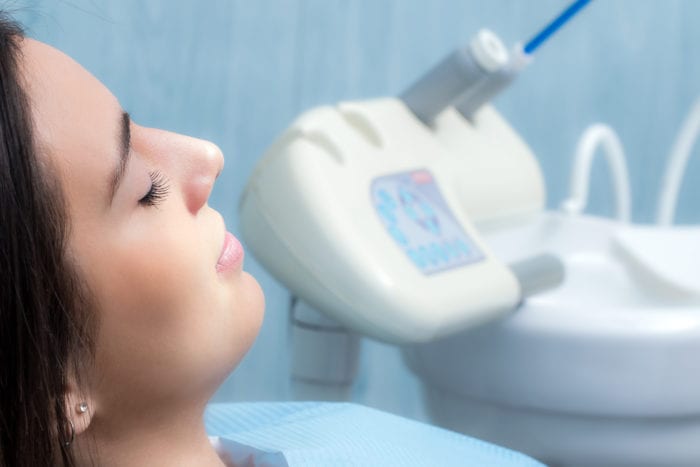Periodontitis, or gum disease, can inevitably lead to tooth loss when left untreated. “Periodontal” means “around the tooth” because periodontal disease affects the gums and bones supporting the teeth. Gum disease begins when the gums become inflamed due to bacteria in plaque, a sticky, colorless film that forms on your teeth.
Over time, periodontitis leads to gum recession and loosens permanent teeth. At Dental Health Group, we restore gum health with periodontal disease treatment in our Colmar, PA, dental office.

Gum Disease: Causes and Symptoms
Harmful bacteria are the leading cause of periodontal disease; other factors can also be attributed to affecting the health of the gums and bone, including:
- Smoking or Tobacco Use
- Stress
- Genetics
- Pregnancy
- Medications
- Diabetes
- Poor Nutrition
Gum disease comes in many forms. Gingivitis is perhaps the mildest form of gum disease. While the gums become red, swollen, and bleed easily, there is very little to no discomfort associated at this stage of the disease. A good oral hygiene regimen and treatment from your dentist can reverse gingivitis.
Periodontitis is another form of periodontal disease and can be aggressive or chronic. Aggressive periodontitis displays rapid bone destruction and attachment loss in clinically healthy patients. Chronic periodontitis is one of the most common forms of periodontal disease frequently seen in adults. The stages progress slowly and can be recognized by gum recession and pocket formation.
Periodontal Disease Treatment in Colmar, PA
In certain cases, periodontal surgery may be recommended to treat periodontal disease when non-surgical treatment is ineffective. To treat periodontal disease, we may advise procedures such as pocket reduction, soft tissue grafts, or bone regeneration. Dental implants are always an option for permanent tooth replacement if a tooth has been lost due to periodontal disease.
Good oral hygiene and regular visits with your dentist and periodontist can prevent periodontal disease. Daily brushing and flossing can keep plaque to a minimum and, in conjunction with professional cleanings 2-4 times a year, can keep your teeth healthy for life.
Frequently Asked Questions
How can I tell if I have periodontal disease if I don’t have pain?
Periodontal disease often starts quietly, without pain. Watch for signs like bleeding gums when brushing or flossing, persistent bad breath, swollen gums, or gums pulling away from your teeth. Even without discomfort, these symptoms indicate possible gum disease. Regular dental checkups help catch it early before significant damage occurs. If you notice these signs, schedule a meeting with our office promptly.
How long does it take to recover from periodontal surgery?
Recovery from periodontal surgery usually takes around one to two weeks. Most patients experience mild discomfort, swelling, or sensitivity for a few days, which gradually improves. You can generally resume normal activities within a few days, but complete healing can take several weeks, depending on the surgery type. We’ll provide clear post-op instructions to speed your recovery and minimize discomfort.
Can periodontal disease increase my risk for other health conditions?
Yes, periodontal disease can increase your risk for other serious health issues. Research links gum disease to heart disease, diabetes, stroke, respiratory illnesses, and even pregnancy complications. Chronic inflammation caused by gum disease can affect your overall health, not just your mouth. Good oral hygiene and regular checkups are crucial in protecting both your dental and overall health.
Can periodontal disease be reversed, or is it permanent?
Early gingivitis can be reversed entirely with proper care. However, true periodontal disease, where bone loss has occurred, cannot be fully reversed. We can effectively stop its progression and manage the condition through deep cleanings, improved home care, and regular maintenance. The lost bone and gum tissue won’t regenerate naturally, but treatment prevents further damage.
Is laser treatment an option for periodontal disease?
Yes, laser treatment is an effective option for managing periodontal disease. It’s minimally invasive, reduces discomfort and healing time, and precisely targets infected tissue and bacteria beneath your gums. Laser therapy also promotes quicker gum healing compared to traditional methods. We’ll evaluate your gum condition and determine if laser treatment suits you.
Can I still get dental implants if I have had periodontal disease?
Having periodontal disease doesn’t automatically rule out dental implants. Implants can still be an excellent choice if the disease is under control and your jawbone is healthy enough. In some cases, additional treatments, like bone grafts or gum therapy, might be necessary beforehand. We’ll thoroughly assess your situation and outline a clear path to successful implants.
Can stress really contribute to periodontal disease?
Yes, stress can significantly contribute to periodontal disease. Chronic stress weakens your immune system and puts you more in danger of infections. It can also lead to habits like clenching or grinding teeth. This can further irritate your gums. You can manage stress through lifestyle changes or relaxation techniques. These changes can benefit your oral health and overall wellness.
Restore Your Gums
Are you noticing changes in your gum health? Do your gums bleed when you brush your teeth? Contact our office for an examination or periodontal therapy today at (215) 774-6702. You can also schedule a dental consultation with our team on our website.
